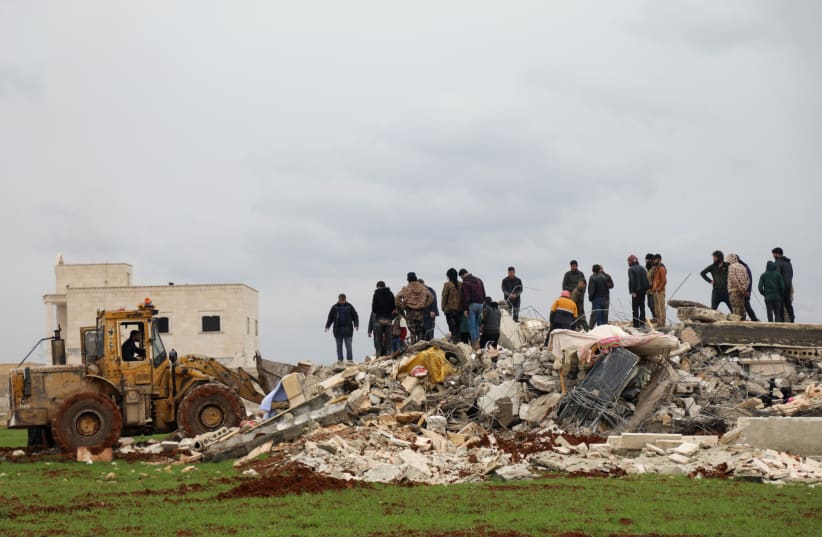Sickness or the death of those we love has a knack for putting things in perspective.
In the immediate aftermath there are pledges to appreciate the moment; to not get bogged down by the little stuff; to identify and place emphasis on what is important, while de-emphasizing that which is not; to work less and spend more time with loved ones.
Time, however, has a power of its own, and often these pledges are forgotten and old habits have taken up anew as the days, weeks and years pass. Sometimes it takes a short time to return to old ways, sometimes the rejigging of priorities triggered by a personal tragedy takes longer to fade. But the old ways generally do seep back in.
The same can be said of how we deal with natural disasters.
One was flooded by a torrent of emotions while watching the heart-breaking images that emerged from the aftermath of the devastating earthquakes Monday in southern Turkey and northern Syria. Compassion. Sympathy. Horror at the seeming randomness of it all. Gratitude that it was not us. Concern that the same thing could happen under our feet, and fear that if it ever did we are woefully unprepared to deal with it.
There was also the recognition of the puniness and helplessness of man in the face of the overwhelming power of nature, and a sense of shared humanity.
That sense of shared humanity compels neighbors and even adversaries and enemies to extend a hand in the face of a devastating natural disaster. The size of the disaster tends to make the causes of their adversity seem inconsequential by comparison.
As such, Armenia and Greece, long-time enemies and rivals of Turkey, offered aid to Ankara. By the same token, Israel said it would provide humanitarian assistance to Syria if asked, with Prime Minister Benjamin Netanyahu saying such a request was made, but the Syrian press wasted little time in denying it.
If earthquakes can collapse multi-storied buildings in an instant, then they should be able – at least temporarily – to tear down barriers between warring states. Natural disasters of huge dimensions should compel countries affected to put aside differences and deal with the pressing task at hand of saving lives, taking help from any quarter to do so.
The operative word here is “should.”
The truth, however, is that life does not always mirror a John Lennon song.
Israel continues to be rejected by its neighbors
In 2003, for example, Iran rejected an Israeli offer of aid after a devastating earthquake in the southeast of the country killed more than 26,000 people. In 2017, when another trembler hit Iran, Netanyahu said Israel again offered aid but was turned down.
Nature is raw; nature can be devastating; nature could bring people together to work together to face the common challenges it presents.
Sometimes it does, sometimes it doesn’t.
With Iran, natural disasters had no impact on how it views Israel. The recent earthquake is unlikely to do anything to change Syrian attitudes toward Israel, either. But with Turkey, the presence of some 150 Israeli uniformed personnel digging through the rubble and lending a hand may alter some of the twisted perceptions that exist there toward the Jewish state. Remember, up until recently, Israel was demonized in Recep Tayyip Erdogan’s Turkey.
But that is not why Israel is dispatching 150 soldiers to engage in search and rescue missions. It is doing so because a neighbor is in need, and this is what you do when a neighbor is in need. If some tangential benefits accrue later, then they accrue later. Still, you dispatch now because of a moral imperative to do so, not because of a desire to engage in “disaster diplomacy.”
Not that there’s anything wrong with disaster diplomacy – assisting another country with an eye on improving ties. But were that motivation to be the primary one it would breed cynicism.
Disaster diplomacy has a limited shelf-life
Besides, disaster diplomacy has a limited shelf-life. In 1999, Israel dispatched rescue workers to Turkey to help in the aftermath of another devastating earthquake there. A mere four years later, Erdogan came to power, and soon after the country’s ties headed south – despite the aid rendered when Turkey was in need.
The mission the Israeli rescue workers in Turkey are currently on is difficult in many regards: the work is back-breaking and emotionally draining; the terrain is challenging; the weather is freezing. In addition, Channel 12 reported that the area where the team is operating is not known for its friendliness toward Israel. On the contrary, said military correspondent Nir Dvori, it is known for its enmity toward Israel. As a result, the Israeli team there will have guards protecting it.
There is a metaphor somewhere in all that: Even as Israel wants to do good, it needs protection from those wishing to do it harm. That’s the reality: call it kumbaya, with a twist.

